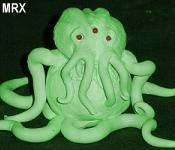Some years ago, I bought out the remaining stock of a small shop that was going out of business as my local mall was dying. They carried a brand of incense that is traditionally displayed in glass jars on a wooden rack, called Wild Berry. If you've never tried it, I highly recommend it. It is made here in Ohio, and it is very good.
Although the incense is very good, and I still stock it, this post is actually about the wooden display racks that I inherited from that little shop that went out of business.
I don't prefer to display my incense in open jars, because of the overwhelming smell and because of people who don't know how to put incense sticks back in the jar where they found it, and because I'm not interested in selling sticks one at a time. I pre-bag my sticks and hang them on a spinner rack. So I ended up re-purposing my two wooden racks to display other items. I scraped off the Wild Berry logo decal and stained them a darker color, to better fit with the store's decor. They are very nice little racks, and I like them a lot, but I needed one more. I like using one over by the window sitting on the main counter, but I need two over at my new incense station across the room (as it turns out, they also fit the cartons of HEM brand incense really well too). I could have bought another one from Wild Berry, but they are a little expensive. They seemed to be a fairly simple design, so I decided to see if I could replicate it.
I actually have room for two and a half of them over at the new incense station, so I figured, if I am going to make one, I may as well make an extra long one, then use one of my existing racks at the window, leaving me with a spare!
I don't have a lot of pics from this build, because I didn't really plan on documenting it. I took most of the pictures after the things was built, and was being stained and finished.
The side walls and rear brace on the originals were made of solid oak. I used 3/4" cabinet grade plywood for my side walls and a piece of 2-by scrap for the rear brace. The vertical faces were made from 1/4" Luan plywood. I don't remember exactly, but I think my shelf bottoms were also made from the 3/4" plywood. I used pocket holes to lock the shelf bottoms and rear brace to the sides, and I used wood glue and pin nails on the rest.
The fabrication of the parts went pretty smoothly, but the assembly and glue-up was a bitch. I probably needed to make some sort of jig to hold the shelves in place as I put it together. I know that doesn't make much sense to any of you, since you can't see the assembly method, but, take my word for it. It needed a jig.
I also had a bit of trouble with the stain. I made the mistake of applying a coat of shellac before the stain, thinking I needed a sanding sealer (which is just dewaxed shellac) to help get even absorption. What I actually needed was pre-stain, not sanding sealer. Oops! Afterwards, the wood didn't want to take the stain at all! I couldn't get even absorption on all the pieces so it looked kind of ridiculous. I ended up basically painting it with stain mixed with shellac to get some color on there. At least no one will really be able to see it when it is in place and loaded up with incense.
Play That Funky Music
-
The Museum of Cryprozoology and Occult Science brings us this creepy skull
lyre made from a real human skull, antelope horns, skin, gut, and hair.
What ...
2 days ago























No comments:
Post a Comment